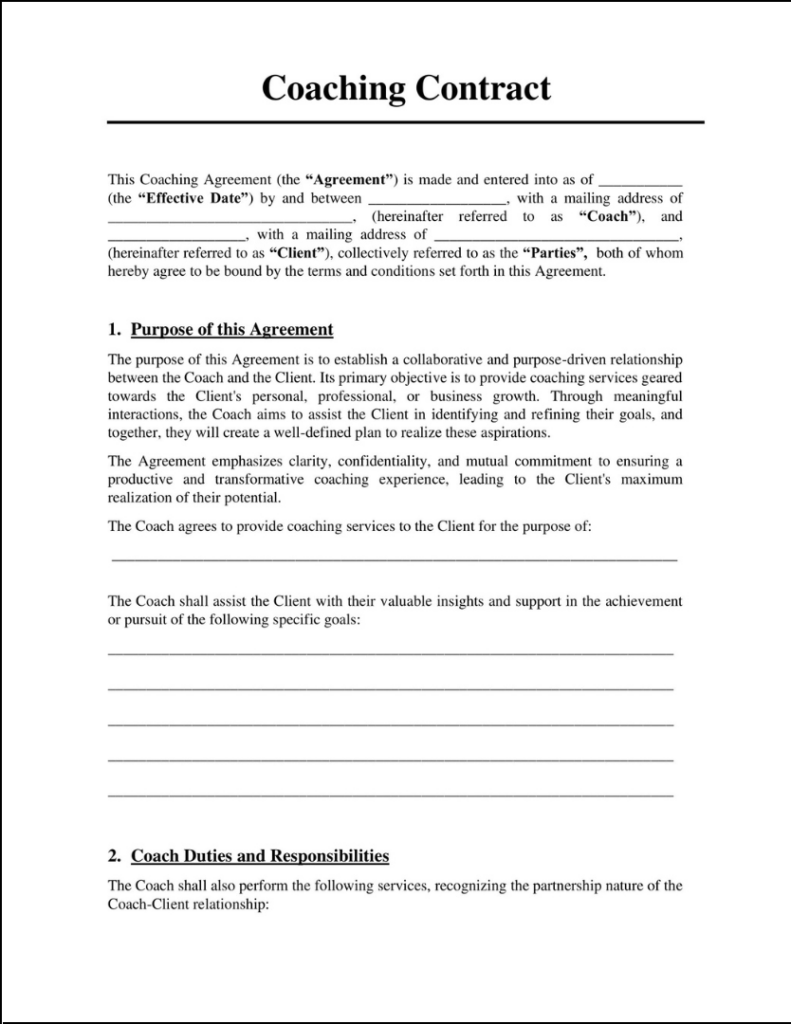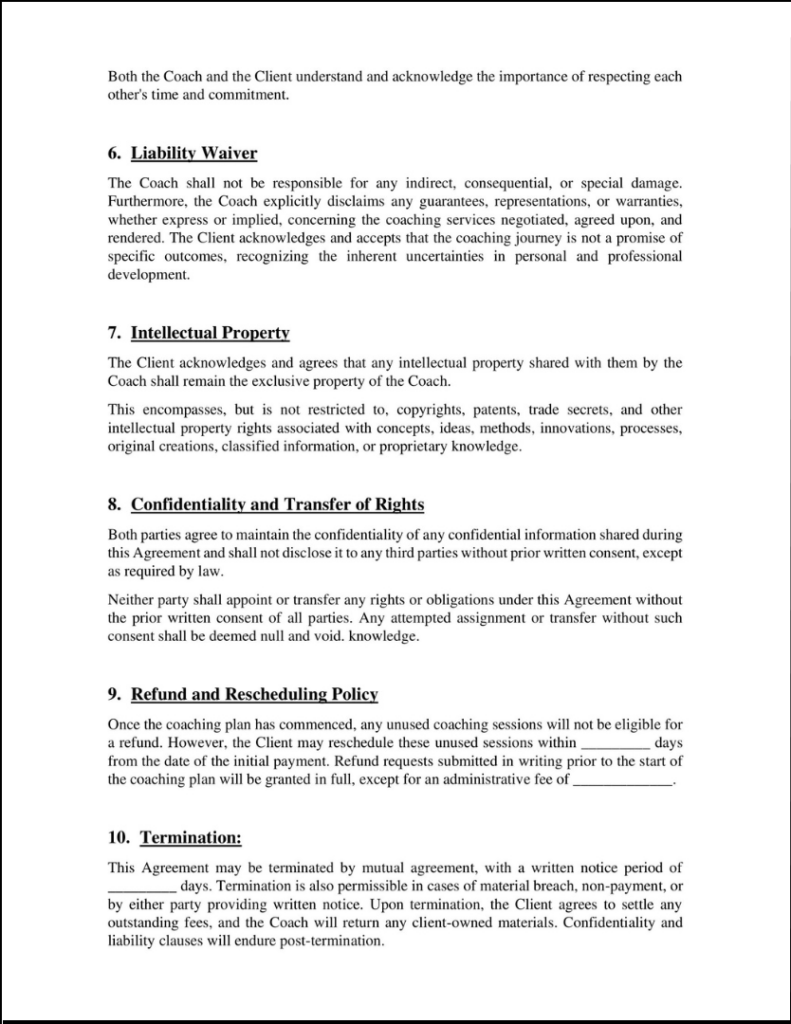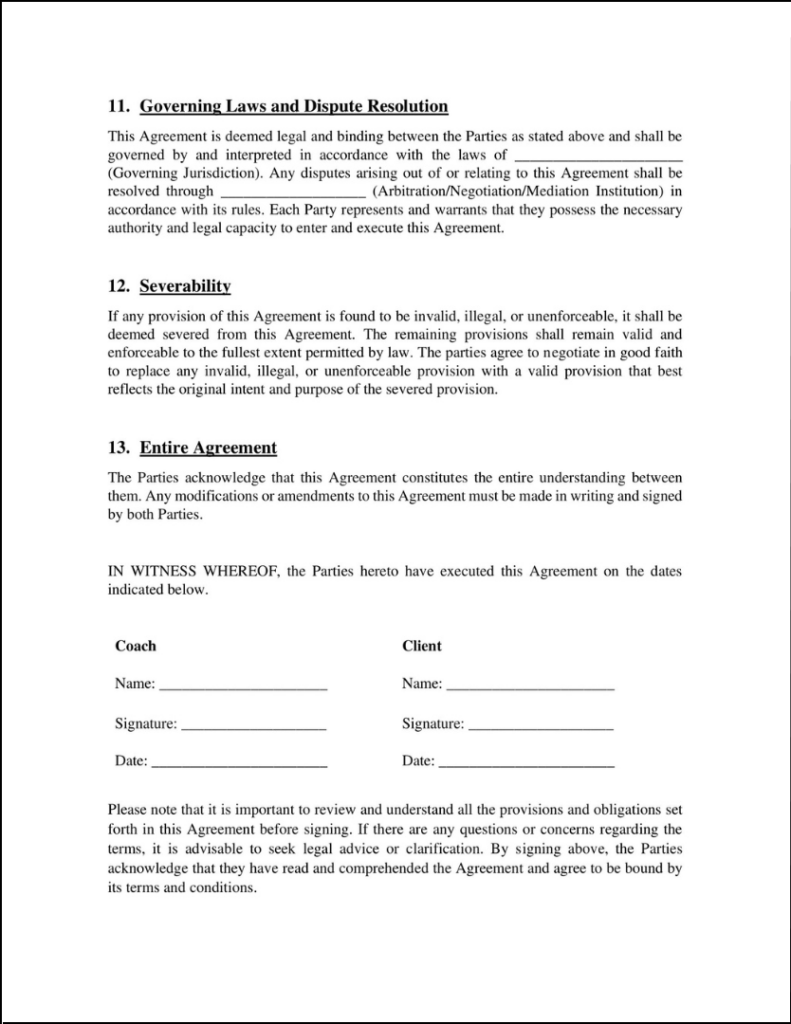Coaching Contract Template
As the demand for coaching services continues to grow, both individuals and organizations are seeking professional coaches to help them achieve personal and professional goals. Whether you’re a seasoned coach or just starting out, having a well-defined coaching contract template is essential for establishing clear expectations and boundaries with your clients.
Our team of professionals, alongside legal advisors and meticulous proofreaders, has crafted an exclusive coaching contract template that ensures safeguarding your business interests while simultaneously expanding your clientele.
What are Coaching Contracts?
Coaching professionals play a crucial role in guiding individuals and teams toward their personal and professional goals. They provide support, motivation, and expertise to help clients achieve desired outcomes and improve their overall performance. While some coaches may work within organizations, many individuals and businesses seek the services of independent contractors or coaching agencies. A coaching contract serves as a formal agreement between coaches and clients, outlining the specific terms and conditions of the coaching engagement.
The primary purpose of a coaching contract is to establish clear expectations, responsibilities, and boundaries for both the coach and the client. It ensures that the coaching relationship is built on mutual understanding and consent, fostering a productive and professional partnership.
Key elements typically included in a coaching contract may cover areas such as the
- scope of services
- duration of the coaching engagement
- confidentiality provisions
- fees and payment terms
- cancellation or termination policies
- any specific terms related to intellectual property rights or dispute resolution.
It is important for both coaches and clients to carefully review and discuss the coaching contract before commencing the coaching engagement. This allows for any necessary adjustments or clarifications to be made, ensuring that the agreement reflects the specific needs and goals of the client.
Free Editable Coaching Contract Sample
Access our free Coaching Contract sample to safeguard your interests. Download now and take proactive steps toward a secure Coaching Contract at no cost.
Why is a coaching contract important?
A coaching contract is essential for a professional coaching relationship. It provides clarity, aligning expectations, responsibilities, and goals for both the coach and the client. The contract safeguards rights, addressing confidentiality, payment terms, termination clauses, and dispute resolution. It enhances professionalism, acting as a reference point for accountability and progress toward desired outcomes. In summary, a professionally executed coaching contract establishes a strong foundation, fostering trust, understanding, and a structured approach to coaching.
Best Strategies for Creating an Effective Coaching Contract
When creating your coaching contract, there are several essential elements to keep in mind to ensure clarity and successful client relationships. Here are the best Strategies to master when creating your coaching service agreement:
1. Clearly Define the Scope
Start by outlining the specific coaching services to be provided. Clearly state the areas of focus, objectives, and goals of the coaching relationship. This ensures both parties have a mutual understanding of the coaching engagement.
2. Establish Duration and Frequency
Determine the duration of the coaching contract and the frequency of coaching sessions. Specify the number of sessions per week or month and the overall timeframe for the coaching relationship. This helps manage expectations and ensures a structured approach to the coaching process.
3. Clarify Roles and Responsibilities
Define both the coach’s and the client’s roles and responsibilities. Outline what is expected from each party, including attendance, participation, and completion of assigned tasks. This promotes accountability and sets a foundation for a productive coaching relationship.
4. Address Confidentiality and Privacy
Include a confidentiality clause to protect the client’s privacy and ensure all discussions and information shared during coaching sessions remain confidential. Assure the client that their personal details and any sensitive information will not be disclosed without their explicit consent.
5. Outline Payment Terms and Cancellation Policy
Specify the coaching fees, payment schedule, and accepted methods of payment. Explain the consequences of late or missed payments. Additionally, include a cancellation policy that outlines any fees or notice periods required for session rescheduling or termination of the coaching agreement.
Remember, while these practices can serve as a helpful guide, it is essential to consult with legal professionals or seek professional advice when creating your coaching contract to ensure it complies with all applicable local laws and regulations.
FAQs Related to Coaching Contract Templates
Disclaimer: Please note that the samples provided here are intended to serve as a helpful resource and should not be considered legal advice. It is important to consult with a qualified attorney or legal professional to ensure that any modifications or usage of these templates align with the specific laws and regulations applicable to your jurisdiction and circumstances. BunnyDoc disclaims any liability or responsibility for the consequences arising from the use or customization of these templates. It is the responsibility of the users to review and adapt these templates to their specific needs, and to seek legal counsel for their particular circumstances.



